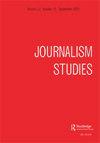Media Self-Censorship in a Self-Censoring Society: Transformation of Journalist-Source Relationships in Hong Kong
IF 2.9
1区 文学
Q1 COMMUNICATION
引用次数: 0
Abstract
ABSTRACT In authoritarian or semi-authoritarian countries where the news media and the society are under tight political control, media self-censorship cannot be understood in isolation from society-wide self-censorship. Based on this premise, this article examines the problematic of media self-censorship by focusing on journalist-source interaction and the media-and-civil-society nexus. The empirical study focuses on Hong Kong after the establishment of the National Security Law in 2020, which ushered in an era of legalization of political and press control. Drawing on 47 in-depth interviews with journalists, this article illustrates how the political environment led to the disappearance of news sources and how media and societal self-censorship were intertwined, creating the friction and frustration that hampered the publication and circulation of critical information and viewpoints. The analysis also noted the unevenness of societal self-censorship and its implications, as well as journalistic responses to the situation. General theoretical implications are discussed.自我审查社会中的媒体自我审查:香港记者与消息来源关系的转变
在新闻媒体和社会受到严密政治控制的威权或半威权国家,媒体自我审查不能脱离全社会的自我审查来理解。在此前提下,本文通过关注记者与消息来源的互动以及媒体与公民社会的关系来审视媒体自我审查的问题。实证研究的重点是2020年《国家安全法》颁布后的香港,迎来了政治控制和新闻控制法制化的时代。通过对47位记者的深度采访,本文阐述了政治环境如何导致新闻来源的消失,以及媒体和社会自我审查如何交织在一起,造成摩擦和挫折,阻碍了关键信息和观点的出版和传播。该分析还指出了社会自我审查的不平衡及其影响,以及新闻工作者对这种情况的反应。讨论了一般的理论含义。
本文章由计算机程序翻译,如有差异,请以英文原文为准。
求助全文
约1分钟内获得全文
求助全文

 求助内容:
求助内容: 应助结果提醒方式:
应助结果提醒方式:


